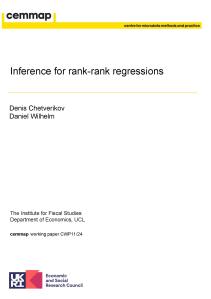This paper studies inference of preference parameters in semiparametric discrete choice models when these parameters are not point-identified and the identified set is characterized by a class of conditional moment inequalities. Exploring the semiparametric modeling restrictions, we show that the identified set can be equivalently formulated by moment inequalities conditional on only two continuous indexing variables. Such formulation holds regardless of the covariate dimension, thereby breaking the curse of dimensionality for nonparametric inference based on the underlying conditional moment inequalities. We further apply this dimension reducing characterization approach to the monotone single index model and to a variety of semiparametric models under which the sign of conditional expectation of a certain transformation of the outcome is the same as that of the indexing variable.
Authors

Research Fellow Columbia University
Sokbae is an IFS Research Fellow and a Professor at Columbia University, with an interest in Econometrics, Applied Microeconomics and Statistics.

Academia Sinica
Journal article details
- DOI
- 10.1016/j.jeconom.2018.12.024
- Publisher
- Journal of Econometrics
- Issue
- Volume 210, Issue 2, June 2020, pages 482-497
Suggested citation
Chen, L and Lee, S. (2020). 'Breaking the curse of dimensionality in conditional moment inequalities for discrete choice models' 210(2/2020), pp.482–497.
More from IFS
Understand this issue

Gender norms, violence and adolescent girls’ trajectories: Evidence from India
24 October 2022

What are the challenges in getting debt on a falling path?
28 June 2024

Election Special: Your questions answered
27 June 2024
Policy analysis

ABC of SV: Limited Information Likelihood Inference in Stochastic Volatility Jump-Diffusion Models
We develop novel methods for estimation and filtering of continuous-time models with stochastic volatility and jumps using so-called Approximate Bayesian Compu- tation which build likelihoods based on limited information.
12 August 2014

Assessing the economic benefits of education: reconciling microeconomic and macroeconomic approaches
This CAYT report discusses the strengths and limitations of several approaches to assessing the effect of education on productivity.
14 March 2013

Misreported schooling, multiple measures and returns to educational qualifications
We provide a number of contributions of policy, practical and methodological interest to the study of the returns to educational qualifications in the presence of misreporting.
1 February 2012
Academic research

Inference for rank-rank regressions
28 May 2024

Understanding Society: minimising selection biases in data collection using mobile apps
2 February 2024

The impact of labour demand shocks when occupational labour supplies are heterogeneous
28 June 2024